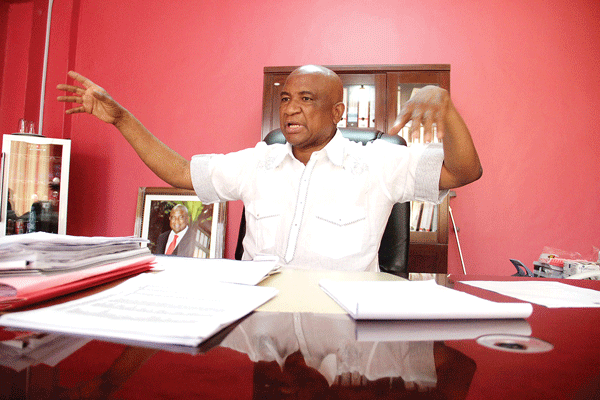
The Confederation of African Football (CAF) presidential elections have come and gone, and the winds of change have blown across the continent.
insidesport with MICHAEL KARIATI

For the first time in 60 years, southern Africa will be controlling the continent’s football after Madagascar’s Ahmad Ahmad convincingly swept to power on a 34-20 election verdict over Cameroon’s Issa Hayatou.
This is something that southern Africa has been crying for, for some time as Ahmad is the first ever CAF president to come from this region since the day the continental football body was formed by Egypt, Ethiopia and Sudan in Addis Ababa, Ethiopia in 1957.
However, that it took 60 years to have a southern African CAF president does not matter. What does is the spectacular way in which that was achieved.
One of the reasons why Hayatou was not a favourite for many in southern Africa and more importantly in Zimbabwe was that he seemed more concerned with football development in West Africa than in this part of the continent. However, there is optimism that Ahmad will change all that.
Locally, there is hope that the country will benefit heavily from the Madagascan football supremo considering the significant role that the small southern African nation played in his ascendancy to power.
However, there is need for Zimbabweans to sort out the football challenges that face their own game before expecting Ahmad’s helping hand.
- Chamisa under fire over US$120K donation
- Mavhunga puts DeMbare into Chibuku quarterfinals
- Pension funds bet on Cabora Bassa oilfields
- Councils defy govt fire tender directive
Keep Reading
Ahmad cannot simply hand over the hosting of the Africa Cup of Nations to countries like Zimbabwe whose facilities are not up to standard simply because they backed him during election time.
The truth is that Zimbabwe — just like any other African country — does not need special favours but should earn the right to host the continental football festival. However, considering the stadia facilities that are in the country at the moment, that is currently not possible.
The Africa Cup of Nations is held traditionally during the month of January and part of February — a period when it would be raining in this part of the world.
Zimbabwe’s stadiums do not have efficient or working drainage systems and hence cannot be used to host any football matches during the time the Africa Cup of Nations are supposed to be in motion as they would be water-logged.
A case in point is that of Barbourfields Stadium, one of Zimbabwe’s targeted venues for the Nations Cup. The semi-finals of the Zimbabwe National Army Charity Shield between Highlanders and FC Platinum was postponed due to the unplayable surface after a heavy downpour.
The international friendly match between Bosso and visiting Power Dynamos of Zambia was also aborted after both clubs complained that the pitch was not suitable for play.
If Barbourfields Stadium is in such a state, what then can one expect from Sakubva, Ascot, Torwood, and Mucheke stadiums, which were among some of the stadiums earmarked for the aborted 2000 Africa Cup of Nations finals?
All along Zimbabwe has been demanding respect from CAF, but the truth is that respect is earned, not demanded. The reason why Zimbabwe are in the CAF football grouping is to compete on the field of play, win, and be recognised.
Ahmad does not play football and only good performance on the field of play by the Warriors and Zimbabwean clubs will earn Zimbabwe the sort of respect they require.
On that premise, Zifa should employ a coach who will see that the Warriors perform better than what they have done in the past three editions that they have qualified for the continental football festival.
Local clubs should also strive to achieve better results in Pan-African football by qualifying regularly for the mini league stage of both the CAF Champions League and the CAF Confederation Cup, and more importantly, they should try to win the tournaments themselves.
Dynamos set the motion in 1998 when they reached the final of the CAF Champions League but since then, Zimbabwean football has gone through a period of gradual decline with none of the clubs reaching the group stages since 2010.
Zifa president Philip Chiyangwa has played his part at Caf but his own house is burning. The challenges that face the Zimbabwean game are far much bigger than those at Caf and the country cannot look to Ahmad to solve them.
As we look ahead after the Caf elections, Chiyangwa should put his focus on the problems in his own backyard to tackle the issue of the Warriors, the Mighty Warriors, club and junior football, Zifa finances, the Zifa family itself, and above all, talk to the city authorities to improve stadia facilities.
Unfortunately, the Zifa boss has his attention elsewhere.
For your views, comments and suggestions, email [email protected] or WhatsApp on 073 4 811 534.











